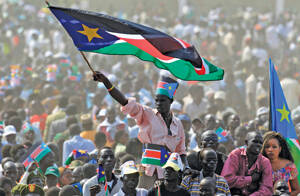On July 9, South Sudan officially broke free of the north and became the world’s newest independent state. The move offers hope for peace and economic development in the new nation even as it struggles to contain a confrontation along the new border with its northern counterpart.
Sudan has experienced intense suffering during decades of civil war that included more than two million deaths between 1983 and 2005. A comprehensive peace agreement in 2005 resulted in the first steps toward the south’s secession. A referendum in January of this year on independence was supported by 99 percent of residents from the south, and now eight million citizens can claim their own nation.
But independence will not wipe away the overwhelming poverty and vulnerability of the new country. The Republic of South Sudan remains one of the poorest and least-developed places in the world. The south, mostly African Christians and followers of traditional religions, also remains challenged by a military threat from the mostly Arab and Muslim north. Disputes over permanent borders and the distribution of oil revenue could lead to a breakdown of the new peace.
Hope persists nonetheless. Dan Griffin, advisor on Sudan to Catholic Relief Services, spoke of the lively spirit of the South Sudanese people after observing the independence ceremonies in Juba, the capital of the new nation. The people, he said, “have a very sincere appreciation of what has been achieved…[and] while they are mindful of the challenges ahead, they know they are on the right path.”
Steve Hilbert, Africa policy adviser to the U.S. bishops’ Office of International Justice and Peace, had a “sense that people in South Sudan are willing to start from scratch.”
“They’re saying, ‘Yes, we’re poor and we have a long way to go, but we are now masters of our own destiny.’” Building basic infrastructure, like schools and medical clinics, will be among the new state’s near-term responsibilities, but there is also much work to be done in developing a “democratic government that practices good governance,” Hilbert said.
John H. Ricard, the retired bishop of Pensacola-Tallahassee in Florida, traveled to Juba to represent the U.S. bishops at the independence celebration. “The people of South Sudan have the vision and will to establish a state and to move forward,” Bishop Ricard said, noting that “they will need outside help to achieve this, which we need to provide.” The bishop added, “The church in South Sudan needs to support and challenge the government to ensure a just and equitable society.”
The ravages of 50 years of violence cannot be quickly relieved. But “as a major service provider in the north and south,” the church can help, said Vincent Bolt, Sudan country representative for the Catholic Agency for Overseas Development.
“While the achievement of independence should not be belittled, the event should not distract” from the challenges ahead, Bolt said. More than 800,000 southerners dislocated by the war are expected to return from the north. The path toward a stable and sustainable statehood will be long and arduous for the new African country. Nevertheless, the spirit of hope runs high for a community experiencing the first breath of independence.








